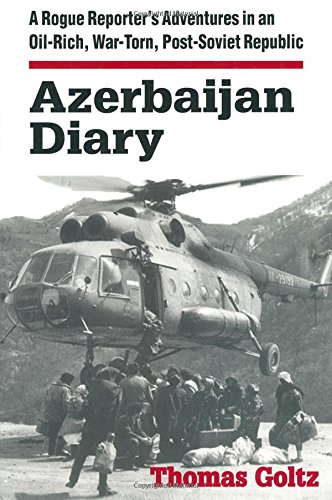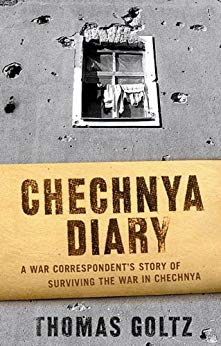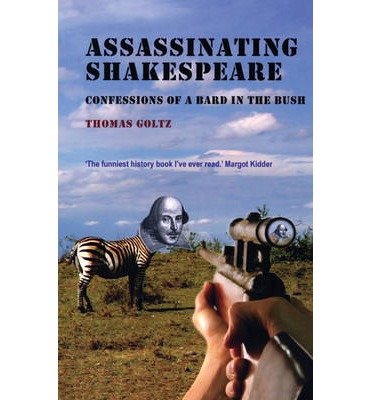Background
Goltz was born on October 11, 1954, in Japan. He was raised in North Dakota.

2012
Thomas Goltz
New York University, New York City, New York, United States
Thomas Goltz graduated from New York University with an Master of Arts in Middle East studies.
Thomas Goltz
Thomas Goltz
Thomas Goltz
Thomas Goltz









(In its first years as an independent state, Azerbaijan wa...)
In its first years as an independent state, Azerbaijan was a prime example of post-Soviet chaos - beset by coups and civil strife and astride an ethnic, political and religious divide. Author Goltz was detoured in Baku in mid-1991 and decided to stay, this diary is the record of his experiences.
http://www.amazon.com/gp/product/0765602431/?tag=2022091-20
1998

(Chechnya Diary is a story about "the story" of the war in...)
Chechnya Diary is a story about "the story" of the war in Chechnya, the "rogue republic" that attempted to secede from the Russian Federation at the time of the collapse of the Soviet Union in 1991. Specifically, it is the story of the Samashki Massacre, a symbol of the Russian brutality that was employed to crush Chechen resistance.
https://www.amazon.com/gp/product/B00FO6UTA6/?tag=2022091-20
2003

(In 1976, Thomas Goltz, then a naive twenty-one-year-old o...)
In 1976, Thomas Goltz, then a naive twenty-one-year-old on the trail of his errant brother, worked his way around Africa putting on one-man Shakespeare performances. This impulsive trip saw him wandering through the cities and villages of East, Central and Southern Africa.
http://www.amazon.com/gp/product/B00FBC2J3S/?tag=2022091-20
2006
historian journalist writer academic
Goltz was born on October 11, 1954, in Japan. He was raised in North Dakota.
Thomas Goltz graduated from New York University with an Master of Arts in Middle East studies.
Thomas worked as a foreign correspondent at the New York Times, New York City. He also was a correspondent at Pacific News Service and worked as a lecturer and a documentary filmmaker.
The 1998 Azerbaijan Diary covers the tumultuous period in Azerbaijan following its succession from the former Soviet Union. Goltz witnessed Azerbaijan’s struggle for independence, its war with neighboring Armenia, and the emergence of President Abulfez Elchibey. Times Literary Supplement contributor Harold Elletson called the book “a fascinating and authoritative account of the end of Soviet rule and the beginning of Azeri independence.” Writing in the Wall Street Journal, Hugh Pope noted that although Goltz’s “Hunter Thompson-like testimony cries out for an editor,” Azerbaijan Diary “includes much compelling reporting.” Goltz, often facing dangerous situations, witnessed firsthand the clash between Azerbaijan and Armenia as the war turned neighbor against neighbor, often with deadly results. According to Library Journal contributor Zachary T. Irwin, Goltz’s “personal courage and linguistic skill made possible this unique witness to (Azerbaijan’s) first years of independence.” He traveled with soldiers, dodged bullets, and lived among the people during these times. Times Literary Supplement contributor Harold Elletson admired Goltz for his willingness “to look beyond the ‘spin’ for the real truth in conflicts.”
He spends about half the year in the field and a half in Montana, where he taught part-time at Montana State University in Bozeman, Montana.
Thomas Goltz is known as a foreign correspondent, who has written about the former Soviet republic of Azerbaijan. His most famous books are Requiem for a Would-Be Republic: The Rise and Demise of the Former Soviet Republic of Azerbaijan: A Personal Account of the Years 1991-1993 and Azerbaijan Diary: A Rogue Reporter’s Adventures in an Oil-Rich, War-Torn, Post-Soviet Republic. He has also been a contributor to periodicals and Internet publications, including Jinn Magazine and the Washington Quarterly.
(Chechnya Diary is a story about "the story" of the war in...)
2003(In its first years as an independent state, Azerbaijan wa...)
1998(In 1976, Thomas Goltz, then a naive twenty-one-year-old o...)
2006Thomas speaks German, Turkish, Azerbaijani, Russian and (neglected) Arabic, as well as bits and pieces of Chechen, Georgia and Kurdish.
